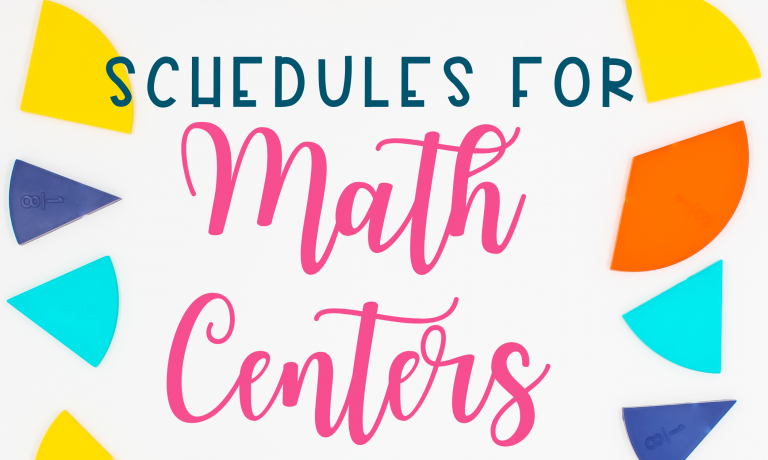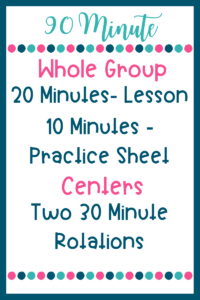Math centers make me leap with joy, and so this blog series is a blast to write! If you missed any of the other posts in the series, you can click below to get caught up.
Part 1: Why You Need Math Centers
Part 2: Math Center Activities
Making Time
I have so many teachers tell me that they just don’t have time for math centers. I personally view math center schedules as the most important part of my math instructional block. I MAKE time for them!
I am lucky enough to have 90 minutes for math. I have this much time because I don’t give much of any time for morning work. We don’t have class meetings or spend too much time on classroom management programs. We reserve large blocks of time for social studies and science on Fridays rather than short blocks the rest of the week.
I know that many of you have no choice in the matter and have only an hour for math. That sure makes me sad, but you do what you have to do! I would look at other places in your day and see where you can squeeze in some extra math minutes. Can the math fact sheet be done as bell work? Can you skip count while you walk to specials? Can you flip your instruction and make videos of your lessons for students to watch as homework? Get creative!
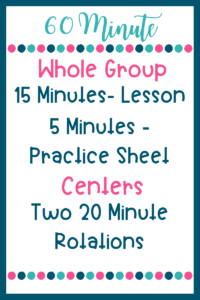
Whole Group
The only way that it will work is if you keep the whole group lesson short and sweet! You cannot teach at the speed of your lowest learner! There isn’t time to do 20 examples on the board. You aren’t going to pass out a bunch of manipulatives. Everyone doesn’t have to master the skill during the whole group. You will be meeting with them in the small groups later that day or the next and you will be able to supplement and help them to grasp the skills then.
Your instruction is not over when whole group time is over. That is just the beginning. Think of your whole group lesson as the introduction to the skill.
I have lots of teachers who ask, “But what about those kids who can’t finish the practice sheet in ten minutes?” I find that my higher learners will complete the sheet while my lower learners do not. That’s differentiation at its finest. The problems tend to get tricker as they move down the page. My lower learners just aren’t ready for the challenge. We can work on it in small groups! If I give my low learners enough time to complete the page, they are likely to get several incorrect and my high learners are bored.
Tips for keeping the whole group lesson short and sweet:
- Read the lesson ahead of time (GASP!) and highlight the most important parts.
- Until you get used to delivering short whole group lessons, practice giving your lesson to a stuffed animal the night before.
- Prep any example problems prior to the lesson so that time is not wasted with you writing on the board while students just watch.
- Don’t repeat yourself over and over. It is a teacher’s habit and we all do it, but students get used to it and stop listening.
- Hold off on the manipulatives if possible. Perhaps you can draw pictures instead.
- Don’t have kids come up to the board to complete a problem. Have everyone do it on their whiteboards and then quickly teach their partner how they solved the problem.
The Key
I am about to share the single most important thing I did to make my math centers run like a well-oiled machine.
I only have two center rotations per day. Therefore, I don’t meet with every group every day.
That might sound like a bad idea to some of you, but it truly made my math center routine a hundred percent easier to manage and more meaningful for students. Let me explain…
Here is what math center time used to be like:
I had four groups and was meeting with each of them for 15 minutes per day. Or was I? Students had to put away materials from one center and get materials for the next. Time was wasted. By the time I really had my group in front of me and ready to work, we might have 12 minutes. That is time to go through one problem with manipulatives. Then we must hurriedly change centers again.
I wasn’t getting time to dig in deep with my group and we all felt stressed by the constant changing of activities before we had truly enough time to get anything done.
Here is what math center time is like now:
I meet with two groups per day for 30 minutes each. When students are meeting with me, we can do a couple of problems with manipulatives and do an interactive notebook activity.
Less time is being wasted with transitions and we are able to get more accomplished. The vibe in the room is a whole lot less stressed.
Math Center Schedules for Four Groups (Larger Class):
I would use this routine for any class with over 18 students. You will have four leveled groups. It is important that we keep the groups small enough to be meaningful.
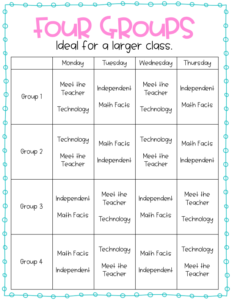
With this schedule, you will meet with groups 1 & 2 on Mondays and Wednesdays and you will meet with groups 3 & 4 on Tuesdays and Thursdays.
Math Center Schedules for Three Groups (Smaller Class):
If you have 18 or fewer students, you can try this schedule with three groups.
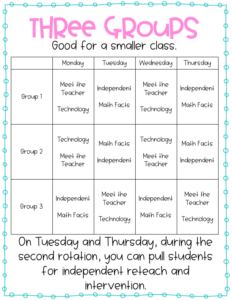
With this schedule, you will meet with groups 1 & 2 on Mondays and Wednesdays. You will meet with group 3 on Tuesdays and Thursdays.
This leaves you a rotation block without a scheduled group. You can use this time to pull a few students who need extra support. You can help kiddos who have been absent. It is the perfect opportunity for some reteach and intervention. This schedule works well for teachers who are required to meet with lower learners every day.
Posting the Math Center Schedules
You will need a simple way to post your math center schedule so students have a reference. I think that it is important that the schedule is easy to change so that groups can be fluid and students can easily be switched to different groups when necessary.
I simply have a poster for each group. Their schedule is typed at the bottom. I laminate the poster and then use a dry erase marker or a vis-a-vis marker to write student names. It is super simple, but works perfectly!
I know that you may need to adapt things to make the schedule work for your classroom, but I hope that you have some ideas for making time for a simple math center routine!
Enter your name and email address below to get free math centers posters sent straight to your email!
